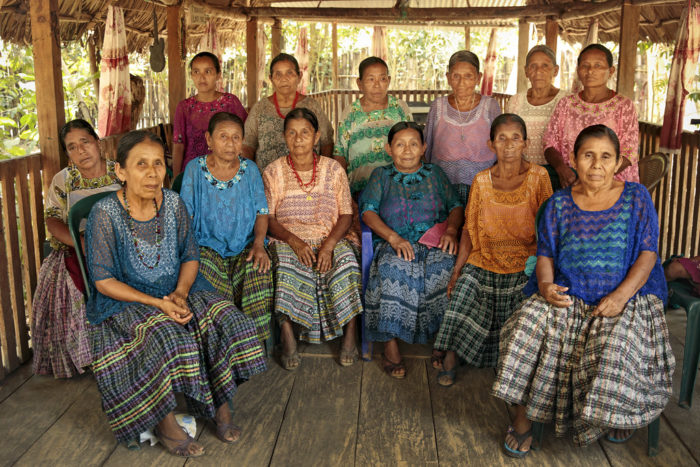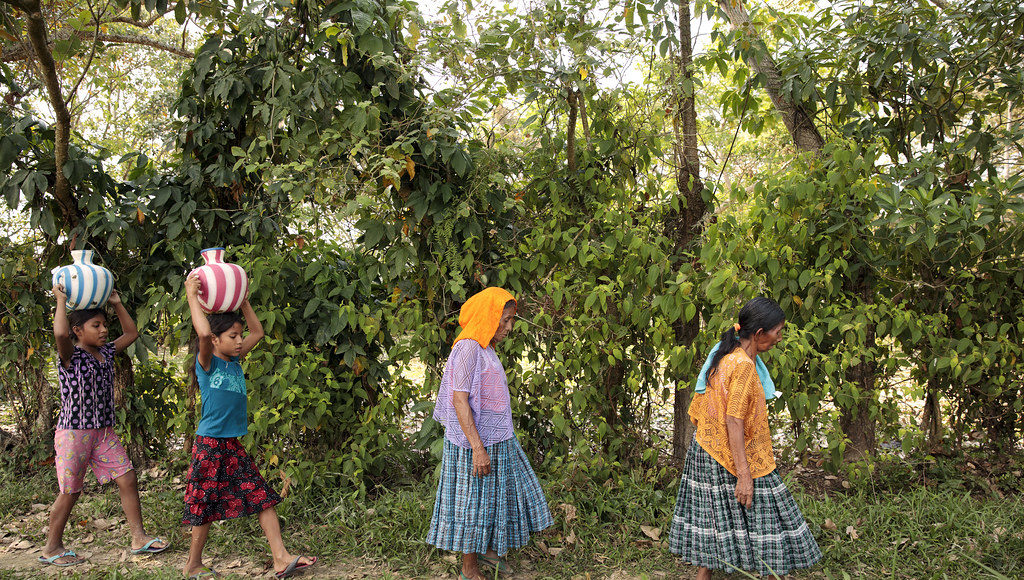The 1996 Peace Accord to conclude the armed conflict in Guatemala was the first in Latin America to recognise violence against women and create specific mechanisms for indigenous women to report violence.
UN Women report that one of these mechanisms, the Guatemalan Commission for Historical Clarification, found sexual violence was prevalent during the three decades of the conflict and that the figures on sexual violence are underestimated in relation to other human rights violations.
The Commission was perceived to be a turning point in tackling gender and ethnic inequality, with a particular focus on guaranteeing (especially indigenous) women and girls a life free from discrimination and violence. It also constituted an important step in beginning to make amends for atrocities committed against these communities during the civil war.
During the first Court of Conscience On Sexual Violence Against Women During the Internal Armed Conflict, in 2010, in which women told their stories of abuse, it was declared that violence against women and impunity went against women’s human rights.
Despite this acknowledgement, more than two decades on Guatemalan women still face precarious and complicated conditions. This is visible in the high rates of gender-based violence and femicide that plague Guatemalan society. In addition, impunity for these crimes is still widespread, meaning many women are unable to experience a sense of justice.
In 2020 alone, according to the Public Ministry’s Women’s Observatory (Observatorio de las Mujeres del Ministerio Público) 455 femicides were registered, with 199 daily average reports of violence against girls and women.
Within this context, it is known that indigenous women are particularly vulnerable and more likely to fall victim to these sorts of crimes. Unfortunately, in practice, these numbers are likely to be much higher as many offences go unreported and therefore unrecorded.
State neglect
Further testament to these unfavourable conditions for women is the preventable tragedy of March 8, 2017, in which 41 young, vulnerable and predominantly indigenous girls died in a fire, with 15 more being injured. This all occurred under police watch.
It emerged that many of these girls had suffered neglect and sexual abuse whilst residing at the government-run home, Virgen de la Asunción, in San José Pinula. The subsequent legal process has been excruciatingly slow and inadequate with several unnecessary delays. Even after four years, only 12 people have been charged with no conclusive or satisfactory outcome being reached.

The challenging pursuit of transitional justice
The themes of state impunity, gender-based violence and discrimination, recurring throughout Guatemala’s history, seem to be entrenched in social, gender and ethnic inequalities dating back to the civil war, where many indigenous people (particularly Mayan women) were subject to inhumane and brutal treatment.
In just the first three months of Rios Montt’s ruthless regime (1982-83), human rights organisations have estimated that there were approximately 10,000 casualties. Montt imposed extremely repressive policies aimed at suppressing any form of dissidence and more than 400 indigenous groups were completely eliminated under his direction.
The near obsession with destroying the internal enemy meant that many innocent Mayan communities, who resided in locations shared by guerrilla fighters, suffered serious abuses ordered by the state including torture, sexual violence and forced disappearances.
The fact that 83% of victims were indigenous allowed the commission to conclude that the government response and handling of the insurgency was consistent with the definition of genocide.
‘Las abuelas de Sepur Zarco’ (the grandmothers of Sepur Zarco) are perhaps the most well-known survivors of this oppressive regime; they were systematically raped and enslaved by government military forces whilst their husbands and sons were forcibly disappeared. Their subsequent struggle for restorative justice has spanned two decades and, even now, many of the promises made to them have yet to be fulfilled.

The demands of Guatemalan women for transformative justice resulted in the aforementioned First Court of Conscience on Sexual Violence Against Women during the armed conflict, taking place in March 2010. This was a symbolic form of justice as the formal legal system was not yet in place.
It allowed women, including those from Sepur Zarco, to break the silence about the abuse they had suffered during the civil war, and led to a criminal lawsuit being presented to the justice system in 2011 by two Women’s organisations: Women Transforming the World (Mujeres Transformando el Mundo) and the Union of Guatemalan Women (UNAMG).
This case also contributed to the trial of Rios Montt in 2014, which initially resulted in him being sentenced to 80 years for his involvement. Yet, in spite of the notoriety of his actions and the supporting evidence, 10 days following this long sought-after and seemingly successful result, a partial retrial was ordered as the original was declared to be invalid. This decision was likely adopted due to the influence of elites and the military sector over Guatemala’s judicial and political institutions.
The retrial was unable to take place as Ríos Montt died on 1 April 2018 without the women obtaining the justice they had waited so long for. This ended an era which consistently represented the rampant injustice, inequality, and state impunity so prevalent in Guatemalan society.
Where do we go from here?
The failure to secure justice in these cases, and many more, represents a fundamental flaw in Guatemala’s past and current democratic institutions and undermines the rule of law. The government’s lack of concrete action to combat such offences and hold perpetrators to account means they continue to facilitate and perpetuate a culture of gender, social and ethnic inequalities.
Instances of state impunity and limited accountability – both in conflict and post-conflict contexts – results in a debilitating normalisation of violence against women and girls. Before the State can begin to recover from the heinous crimes committed in the past, and uphold their guarantee to all citizens for a life free from violence, the issue must be addressed.
Learn more about the Hogar Seguro case and the women’s group supporting survivors and families of the victims through counselling, legal support and creative campaigns, in our new podcast, Women Resisting Violence, release 25 November, 2021.




